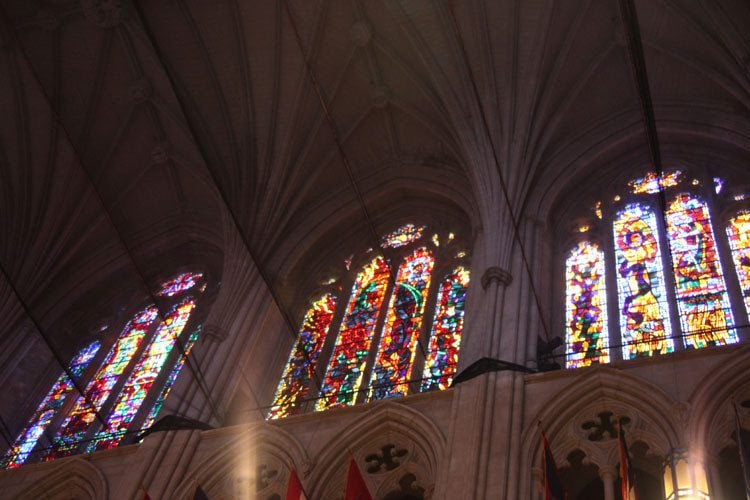The Cult of Cafeteria Worship
I’m terrified that catering to individual aesthetic preferences in worship is killing the church. And by aesthetic preferences, I could mean a lot of different things, but at the top of list is music.
Before I explain myself further, I must admit that I’m being overly simplistic. The cultural factors contributing to church decline are complicated and diverse. But because the church has responded to decline with drastic liturgical adjustments, we must look at the issue liturgically.
There is undoubtedly a deep sentiment within evangelical (and now, also mainline) church culture that dividing your congregation over so-called worship style stimulates growth. I’m not only afraid that this sentiment is false, but I think the opposite is true.
A Confused Congregation
On the surface, the idea that we must appeal to each and every possible aesthetic taste in worship music makes a measure of sense, if we believe that worship is something we do for God, or that music can usher us into a divine encounter.
But worship isn’t something we do for God, nor is music a mystical connector. Worship is about God’s divine impressions on us through word and sacrament, not our human expressions. Corporate worship is a solemn privilege that we must accept with discipline of mind and spirit. This only makes sense when we forsake the idea that we should expect emotional satisfaction or release through worship, and accept that what Jesus offers us through worship is far greater than intense emotional experiences.
But since church culture has convinced itself and its people that corporate worship is primarily about connecting people to God through jesusy music, it is unwittingly offering the perfect excuse to just not show up. Because, for most, the greatest production value the church can afford will not be enough to satisfy Sunday after Sunday, year after year.
Ultimately, when the church doesn’t deliver what is promised through a smorgasbord of options, like traditional or contemporary or blended or modern or emergent or Gen-X or alternative or whatever the hell we call it, they will find something else that offers it. And that’s the thing that becomes the substitute ritual, the sacred space. It will always be more attractive than any attraction the church can offer up as “worship.”
The Most Difficult Lie
15 years ago I was in the middle of my undergraduate studies at Baylor University when everybody started talking about a new book by Donald Miller, Blue Like Jazz. My stodgy theological self was not particularly interested in reading anything with the subtitle, “Nonreligious Thoughts on Christian Spirituality,” but, well, there was this violist that I was desperately trying to impress. She told me it was the best thing ever, and I simply had to read it. So, of course, on her recommendation, I went down to the local now-defunct Christian book chain, pulled out my wad of cash I’d made from waiting tables, and bought me a copy.
As I scanned each page looking for cute lines that my love interest would find endearing, I remember reading a quote, perhaps the most enduring from the entire work, that pierced me all the way to the core:
“The most difficult lie I have ever contended with is this: life is a story about me.”
I struggle with this so very deeply. Not simply from a superficial selfishness, but on a foundational level. My worldview, my feelings, my insecurities, my anxieties, and even my theology are all hopelessly, blindly self-referential. I imagine it’s the same for many of us. Because being a Christian is accepting Jesus as the center of life, the church’s worship must be a real alternative to that.
But I’m terribly afraid the church isn’t being an alternative, at all. It’s using the worship gathering, which from the foundation of the Christian church was about doing God’s story, to affirm us in our deep commitment to ourselves as the center of our own universe.
Let me say this is as plainly as possible:
When we tell our people that we’re here to connect them with God through their own preferences, we are telling our people that worship is about their story.
When we suggest that corporate worship is about fitting everyone just right, we are telling our people that worship is about their story.
When our strategies for church growth hinge on making the worship life of the church fun, entertaining, and easy, we are telling our people that worship is about their story.
When we design worship services to flow seamlessly like a theatrical production, we are telling our people that worship is about their story.
Green Like Golf. Or Whatever.
If it’s about your own story, your own feelings, your own preferences, your own perceived intimacy with God, then the church’s unwitting message is clear:
Go wherever you find it!
Even the Donald himself (Miller, not that Donald) doesn’t get the good vibes at church. A few years ago he wrote a blog post entitled, “I Don’t Worship God By Singing. I Connect With Him Elsewhere,” in which he asserted that he doesn’t feel intimacy with God through singing, he rarely attends church, and most of the most godly and influential Christians he knows don’t regularly attend, either.
He got a lot of backlash about it, but in a roundabout way, I understand completely, and I don’t blame him. If you don’t get the feeling that represents intimacy with God from music, then why wouldn’t you look for that elsewhere. In nature, competition, human relationships, even sleep? After all, that’s what the church has told him about intimacy with God through the way it conducts its Sunday “experiences.”
Photo:
Flickr, creative commons 2.0











